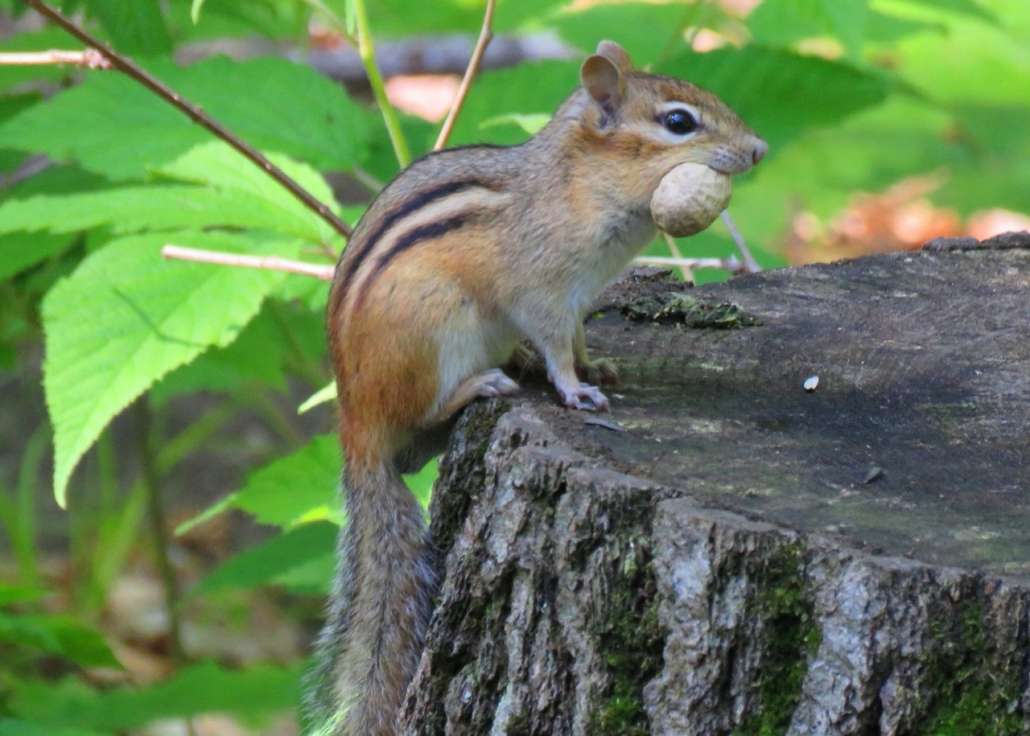CRITTER CHATTER: Is it really hibernation?

 by Jayne Winters
by Jayne Winters
At several recent visits with Don Cote at Duck Pond Wildlife rehab, I couldn’t help but notice that the resident chipmunk has seemed more “chipper” (pun intended) than usual. Despite his rehab stint in the living room, I suspect his natural internal clock is nudging him about the warmer weather, signaling him to become more active, seek food, prepare for nesting and maybe even find a mate.
We all know that hibernation is the time of year when some animals pack it up for the winter and instead of moving south, hunker down to snooze until spring. Survival depends upon their ability to decrease their body temperature, as well as their heart, respiratory and metabolic rates. I was surprised to learn there are only three true hibernators in Maine: little brown bats, whose heart rate drops from 1,000 beats per minute to five; groundhogs, who spend the winter in a den located below the frost line and above the water table, dropping its body temperature to 38°; and meadow jumping mice, who spend only two weeks fattening up and won’t wake to eat or drink until spring.
Other species can reduce their body temperature and metabolic rate during the winter are not considered true hibernators because they rouse easily and can become active during warm periods. This semi-hibernation is called ‘torpor’ and Maine critters that utilize this behavior include black bears, skunks, racoons and reptiles. Reptiles are considered cold-blooded because they can’t produce their own body heat – their temperature is controlled by their environment. When the cooler days of fall arrive, they go into a dormant period called “brumation” [I’d never heard of this!], during which they can survive long periods without eating, but still need to drink to prevent dehydration.
Back to the chipmunks: At around 40°F, they start gathering nuts, seeds, twigs, and other items in those cute little cheek pouches, moving large quantities of food into their burrow storage rooms called ‘caches.’ They’re always busy, gathering up to 165 acorns per day! An enormous amount of food can be held in their cheek pouches, which can stretch to three times the size of the head. Within just two days, a chipmunk will have collected enough food to last through the whole winter. They don’t sleep for the entire season, but wake up occasionally to bring their body temperature back to normal, eat to build up their fat reserves, urinate and defecate. In addition to maintaining a constant lower body temperature for the winter, they slow their heart rate from the usual 350 beats per minute to only four beats per minute. A new study has found that as winter temps become milder because of global warming, chipmunks may become less likely to hibernate in the coldest months. Research indicates that follow normal hibernation procedures have a winter survival rate of about 87 percent, while those that remain active because of warm winter weather are almost certain to die by spring.
I’ve noticed a couple of Chippies in our yard the past few days and I’m sure the little guy at Duck Pond will be happy to be released back into the wild where he can start filling those cheeks!
Don and his volunteers appreciate and thank the other rehabbers who continue to generously accept critter transfers from Duck Pond. Please check the following web sites to see if there is one near you: https://www.mainevetmed.org/wildlife-rehabilitation or https://www.maine.gov/ifw/fish-wildlife/wildlife/living-with-wildlife/orphaned-injured-wildlife/index.html . Donald Cote operates Duck Pond Wildlife Care Center on Rte. 3 in Vassalboro. It is a non-profit state permitted rehab facility which is supported by his own resources and outside donations. Mailing address: 1787 North Belfast Ave., Vassalboro ME 04989 TEL: (207) 445-4326. Please note the previous e-mail address is no longer monitored.
Responsible journalism is hard work!
It is also expensive!
If you enjoy reading The Town Line and the good news we bring you each week, would you consider a donation to help us continue the work we’re doing?
The Town Line is a 501(c)(3) nonprofit private foundation, and all donations are tax deductible under the Internal Revenue Service code.
To help, please visit our online donation page or mail a check payable to The Town Line, PO Box 89, South China, ME 04358. Your contribution is appreciated!


Leave a Reply
Want to join the discussion?Feel free to contribute!